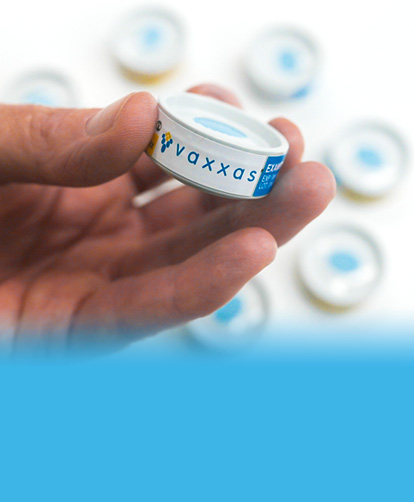Vaxxas Initiates Phase I Clinical Study of First Needle-Free, Inactivated Seasonal Influenza Vaccine Quadrivalent (IIV4) Delivered Using High-Density Microarray Patch (HD-MAP)
FEBRUARY 09, 2023
CAMBRIDGE, MASS. & BRISBANE, AUSTRALIA
- Vaxxas’ proprietary HD-MAP technology platform has the potential to improve vaccination by creating vaccine products that are easy to use (potentially enabling self-administration) and can be stable at room temperature, reducing the complexities and costs associated with refrigerated distribution.
- The vaccine being delivered by the Vaxxas HD-MAP in this Phase I clinical trial is a commercially available seasonal flu vaccine (IIV4) targeting four significant strains of the influenza virus. The specific strains of influenza virus targeted in any given seasonal IIV4 are established annually by regulatory health agencies and encompass two strains of influenza A and two strains of influenza B.
- This Phase I clinical study will include approximately 150 adults, 18 – 50 years of age.
Vaxxas, a clinical-stage biotechnology company commercializing a novel vaccination platform, today announced the initiation of a Phase I clinical trial with the first needle-free inactivated seasonal influenza vaccine quadrivalent (IIV4) candidate delivered using Vaxxas’ proprietary high-density microarray patch (HD-MAP) technology.
The vaccine being delivered by HD-MAPs is a commercially available IIV4. The specific strains of influenza virus targeted in any given seasonal IIV4 are established annually by regulatory health agencies and encompass two strains of influenza A and two strains of influenza B. By targeting four significant strains of the influenza virus, quadrivalent influenza vaccines are designed to offer broad immune coverage against the flu viruses expected to circulate across the globe for a given flu season.
A common infectious disease, influenza is responsible for three to five million severe cases worldwide annually, along with up to 650,000 deaths per year.
Researchers estimate that fear of needles affects up to 25 percent of adults, and may lead to 16 percent of people in developed world countries, such as the US and Australia, skipping routine and pandemic vaccinations.
Vaxxas Chief Executive Officer David L. Hoey said, “Vaccine delivered via a HD-MAP patch is easy to use and can potentially be self-administered; it can simplify distribution by removing or reducing the need for refrigeration; and avoids needles. All factors that could improve access to, and acceptability of, current influenza vaccines, offering greater protection each season to communities around the globe.”
“We are excited by the potential of our needle-free, seasonal flu patch development program. This clinical trial builds upon our compelling body of data from clinical and preclinical studies using flu vaccines,” Mr Hoey said.
In contrast to current influenza vaccines given by needle and syringe which must be stored under refrigerated conditions, typically 2°C – 8°C to remain effective, Vaxxas has shown that influenza vaccine on the HD-MAP can be kept at temperatures up to 40°C, for at least 12 months, without losing effectiveness. These thermostability benefits of a HD-MAP influenza vaccine have the potential to enable broader distribution, at a lower cost.
The Phase I clinical trial will assess the safety, tolerability, and immunogenicity of the inactivated influenza vaccine quadrivalent (IIV4) candidate in approximately 150 healthy participants, aged 18 – 50 years inclusive, who have not received an influenza vaccine within the last six (6) months and have received no vaccines of any kind for at least thirty (30) days prior to participating in the study.
In addition to this seasonal IIV4/HD-MAP Phase I clinical trial, Vaxxas is preparing for clinical evaluation of pandemic influenza vaccine under contract with the United States Biomedical Advanced Research and Development Authority (BARDA). In 2022, the company also initiated a Phase I clinical study of the first COVID-19 vaccine candidate delivered using its HD-MAP technology.
About Vaxxas’ HD-MAP technology and quadrivalent influenza vaccine candidate
The Company’s proprietary HD-MAP technology platform utilizes an ultra-high-density array of projections – invisible to the naked human eye – applied to the skin as a patch sitting inside a small applicator device. When applied to the skin, the patch delivers vaccine to the abundant immune cells immediately below the skin surface. This approach can enhance the efficiency and effectiveness of resulting immune responses of vaccines.
Vaxxas uses proprietary dry-coating technology to apply an active and stable vaccine onto the projections which offers the potential to eliminate the need for vaccine refrigeration during storage and transportation – reducing the resource and logistics burden of maintaining the refrigerated “cold chain”. Ease of use of the HD-MAP could enable simplified administration, potentially encompassing self-administration.
To create the quadrivalent influenza vaccine patch candidate, Vaxxas’ HD-MAP is coated with a commercially available inactivated quadrivalent influenza vaccine and integrated into a single-use applicator, ready-for-vaccination. All vaccine candidates applied to the Vaxxas HD-MAP are designed to be effective and easy-to-use, while meeting industrial-scale manufacturing and commercial logistics requirements.
In extensive laboratory testing published in PLoS Med, Vaxxas’ HD-MAP delivered vaccines have been shown to be stable and remain active when stored and transported at room temperature and demonstrate greater safety and protection, along with a potential for a lower dose, when compared to needle and syringe delivery of vaccine antigens, including influenza as well as measles/rubella and COVID-19 SARS-CoV-2 spike protein. Vaxxas has completed three human clinical studies with its HD-MAP involving more than 300 participants, demonstrating safety, and enhanced immune response of vaccine administration by HD-MAP.
About Vaxxas
Vaxxas is a privately held biotechnology company focused on enhancing the performance of existing and next-generation vaccines with its proprietary high-density microarray patch (HD-MAP). Vaxxas is targeting initial applications in infectious disease and oncology.
Vaxxas’ core technology was initially developed at The University of Queensland (UQ), and the company was established as a start-up in 2011 by UQ’s commercialisation company UniQuest. The company was founded with the completion of an initial equity financing led by OneVentures Innovation Fund I with co-investors Brandon Capital Partners, Brandon BioCatalyst, and US-based HealthCare Ventures, followed by a further financing led by OneVentures. OneVentures Innovation Fund I and Brandon BioCatalyst are supported by the Australian Government’s Innovation Investment Fund (IIF) program. The IIF is an Australian Government venture capital initiative that provides investment capital and managerial expertise through licensed venture capital fund managers to investee companies. Learn more at www.one-ventures.com and www.brandoncapital.vc.
Caution
Vaxxas’ HD-MAP delivered vaccines are under investigation and available only for investigational uses. They are not available anywhere in the world for sale or purchase. As such, Vaxxas makes no claim that the vaccines are reliable, durable, dependable, safe or effective, and makes no claim that it is superior to any other vaccine or vaccine delivery technology.
Contacts
In United States:
Kathryn Morris
The Yates Network
+1 914 204 6412
kathryn@theyatesnetwork.com
In Australia:
Amy Miller
WE Communication
+61 3 8866 1235
+61 431 072 422
amymi@we-worldwide.com




